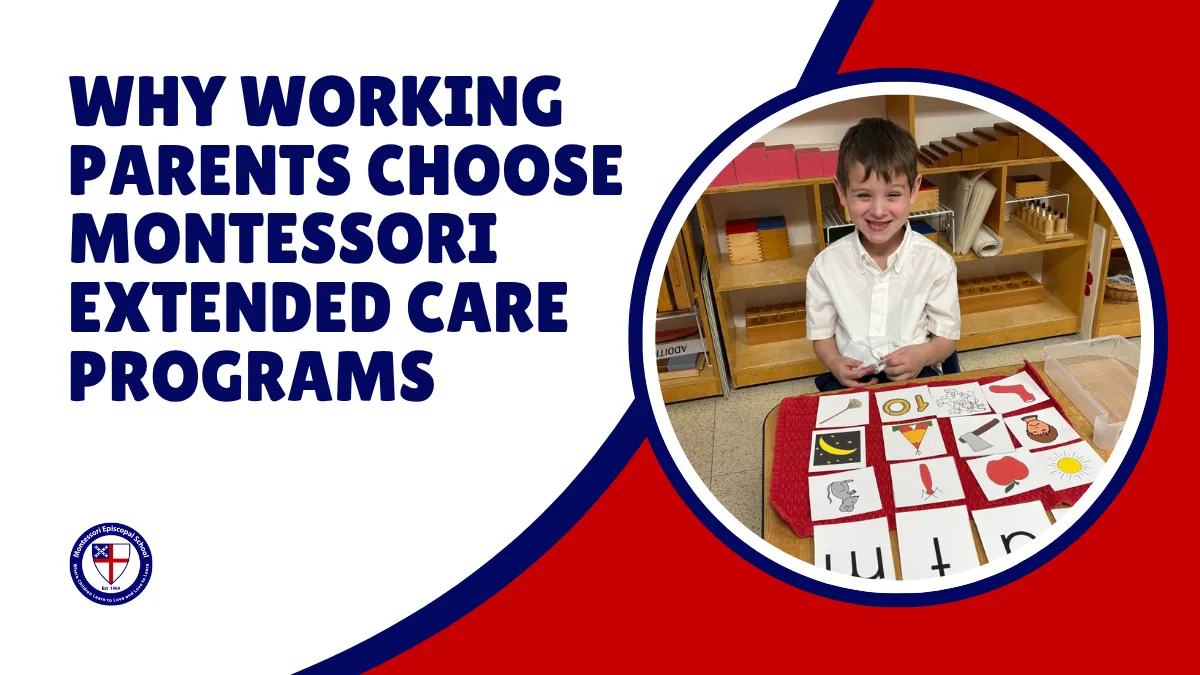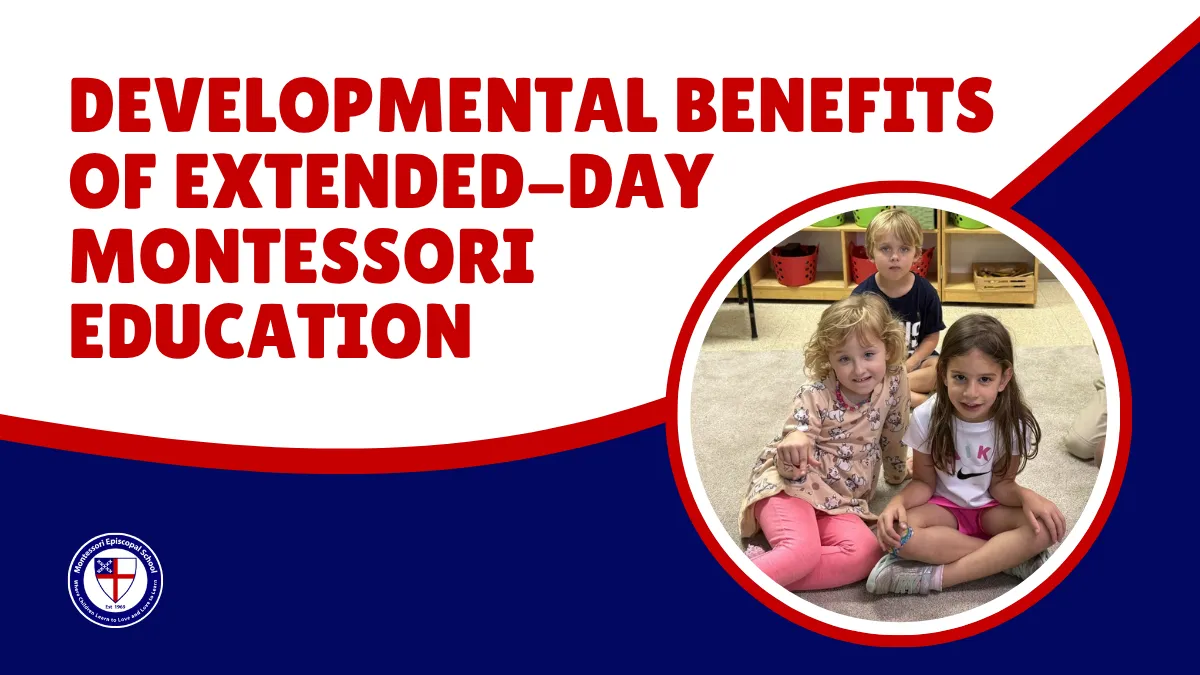5 Powerful Benefits of Montessori Preschool With Extended Hours
Montessori preschool extended hours benefits are increasingly recognized by families seeking structured, child-centered education with added flexibility. At institutions grounded in the Montessori philosophy, extended care hours are not simply a convenience but an intentional extension of the learning environment. These programs provide consistency in routine, offer enriched learning opportunities, and support a child’s development in a calm, prepared setting.
Parents benefit from knowing their children remain in a nurturing, educational atmosphere throughout the day, guided by trained professionals. This structure encourages independence, social responsibility, and purposeful engagement beyond the traditional classroom schedule. For many families, extended hours create a balanced solution that aligns educational excellence with practical needs.
1. Why Working Parents Choose Montessori Extended Care Programs

Montessori extended care programs support families balancing professional obligations and high-quality early education. These programs are designed as a convenience and a thoughtful continuation of Montessori principles throughout the day. This approach offers practical reliability and developmental consistency for many working parents.
A Reliable Solution for Busy Schedules
Parents with full-time careers often need care that extends beyond traditional school hours. Montessori extended care offers a dependable framework that aligns with the rhythms of modern family life.
This structure eases logistical challenges for working parents while providing children with a stable, enriching environment from morning to late afternoon.
Consistency With Montessori Educational Philosophy
Extended hours do not disrupt the child’s experience—they reinforce it. Montessori programs intentionally carry the same philosophy throughout the day, setting them apart from traditional aftercare.
By preserving the integrity of Montessori principles, extended care becomes a natural extension of the child’s learning journey.
Supportive for the Entire Family Unit
These programs help create a sustainable balance between career and family life. Working parents benefit from the logistical support and the knowledge that their children are in a purposeful setting.
Such features make Montessori extended care a meaningful choice for families prioritizing quality education and practical reliability.
2. Montessori All-Day Program vs Traditional Daycare Models
When comparing a Montessori all-day program with traditional daycare models, important distinctions arise in philosophy, structure, and developmental outcomes. Families seeking intentional, child-centered care often find that the Montessori approach offers a deeper level of engagement, even during extended hours.
Educational Philosophy and Daily Purpose
Montessori all-day programs are grounded in a consistent educational framework that respects the child’s independence and natural curiosity. Traditional daycare, by contrast, may focus more on supervision and recreational activities than on structured learning.
This approach confirms that learning is integrated into every part of the day rather than segmented into “education” and “care.”
Staff Training and Interaction
The quality of adult-child interaction varies significantly between Montessori programs and conventional daycare settings. Montessori educators are trained to guide rather than direct, fostering independence and critical thinking.
These characteristics contribute to a more intentional, nurturing atmosphere where children can thrive.
Structure and Environment
The physical and emotional environment of a Montessori all-day program is designed to foster calm, order, and concentration, unlike the more casual and variable daycare setting.
Families who value structure, individualized growth, and holistic learning often prefer Montessori all-day programs over traditional daycare models.
3. Developmental Benefits of Extended-Day Montessori Education

Extended-day Montessori education offers more than schedule flexibility—it provides meaningful developmental support across emotional, cognitive, and social domains. The structure of an extended Montessori day is intentionally designed to reinforce the child’s natural growth patterns while maintaining consistency in the environment and expectations.
Enhanced Social and Emotional Growth
With more time in a collaborative, respectful setting, children have increased opportunities to develop social-emotional awareness and interpersonal skills.
These interactions support the child’s emotional maturity and sense of belonging within a community.
Greater Opportunities for Concentration and Mastery
Extended hours allow children to engage in longer, uninterrupted work periods, fostering deeper concentration and internal motivation.
This continuity supports the development of intrinsic motivation, attention span, and resilience.
Strengthening of Practical Life and Independence Skills
The Montessori environment encourages children to manage their time, care for themselves, and contribute to their surroundings—skills that are strengthened in an extended-day format.
Extended-day Montessori education reinforces key developmental milestones while nurturing self-discipline, confidence, and purposeful behavior.
4. Strengthening Parent-School Partnerships Through Extended Hours
Extended hours in Montessori education offer more than practical support—they foster stronger, more collaborative relationships between families and the school community. Extended-day programs help parents remain closely involved in their child’s educational journey by providing additional touchpoints and consistent communication.
Increased Opportunities for Communication
Children attending school for longer periods have more chances for meaningful interaction between parents and staff. Regular updates and informal conversations support alignment on the child’s needs and progress.
This consistent dialogue helps build trust and promotes a unified approach to the child’s learning.
Alignment on Educational and Behavioral Goals
Extended care reinforces school values and expectations throughout the day, allowing families to see more continuity between home and school life.
This alignment ensures the child experiences consistency, strengthening development and emotional security.
Opportunities for Greater Family Involvement
Extended programs also create additional opportunities for parents to engage with the school community beyond traditional classroom hours.
Extended hours help cultivate a strong, cooperative parent-school partnership by supporting ongoing communication and shared purpose.
5. Encouraging Independence and Responsibility Beyond Core Hours
Montessori extended-day programs are carefully designed to reinforce the core principles of independence and personal responsibility. These values are not limited to morning lessons; they continue throughout the extended hours in a purposeful and age-appropriate manner.
Sustained Practice of Daily Routines
Extended hours offer children additional time to internalize and apply practical life skills that promote autonomy and organization. Routine tasks become opportunities for learning and self-reliance.
These routines instill confidence and accountability, fostering a strong foundation for lifelong habits.
Intentional Use of Time and Materials
Children in Montessori extended care are guided to use their time purposefully, select meaningful activities, and manage their engagement.
Such freedom within limits nurtures decision-making, perseverance, and task ownership.
Consistent Reinforcement of Expectations
The Montessori environment maintains high expectations for respectful conduct and responsibility across all hours. Children understand that the principles guiding their behavior remain steady from arrival to departure. This consistency supports the internalization of independence, encouraging responsible actions beyond the core academic day.
Conclusion
Montessori preschool’s extended hours benefits extend far beyond convenience—they represent a holistic approach to early childhood education that supports families while nurturing the full development of each child. From fostering independence and deepening concentration to building strong school-home partnerships, extended-day Montessori programs offer lasting advantages that align with the values of purposeful learning and respectful guidance. The extended care model provides a meaningful solution rooted in the Montessori tradition for working parents seeking an enriching, consistent, and thoughtful educational setting.
To learn more about how our extended-day program can support your child’s growth, visit our contact page or call us at (972) 895-9050




Leave a Reply
Want to join the discussion?Feel free to contribute!